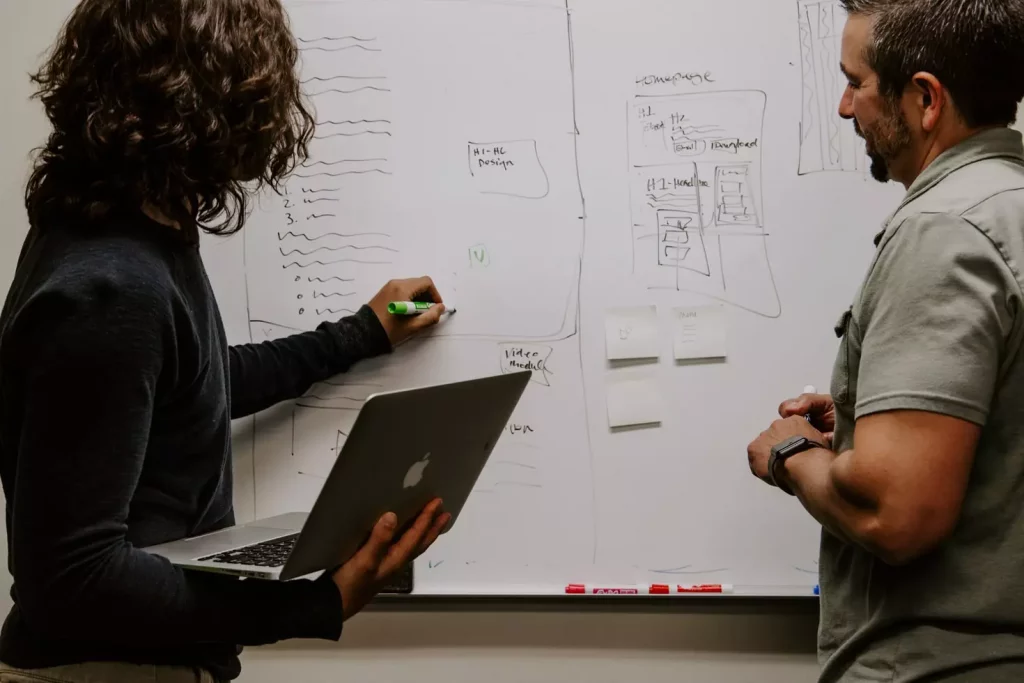IT technologies have gained momentum in the last couple of decades. Each IT company is a unique living organism with its features.
People often see coders in TV shows and movies. There they usually look like geeky 14-years-old boys with social anxiety doing some voodoo stuff on dark screens. In real life, those are qualified professionals with a huge skill set and expert knowledge in many areas doing …well, yes, some voodoo stuff on dark screens.
Professional groups and departments are created for some purpose. In large companies, managers select the members according to their psych type and personal qualities. Requirements for development teams differ depending on the type of the team and the tasks of the company.
Harvard professor J. Richard Hackman highlights the following attributes of a team:
- an efficient team is interdependent
- it has boundaries
- a team is stable
- pursues an exciting goal
- includes people that click together
- demonstrates strong team structure: size, standards, clarity of objectives
- works in a supportive organizational context
Types of Development Teams and their Specifics
- Cross-functional teams. Such teams include people with different competencies. Typical for start-ups or project studios.
- Homogeneous teams. The members have one leading competence, and each person takes responsibility for a small piece of the overall project. They are most typical for large companies.
Developers need to be motivated to achieve a result as a single organism to build up a committed group. Such notice may sound like a communist motto but has nothing to do with it. Looking for a dedicated development team, consider IT companies originating from start-ups. Usually, those have the most relevant and recent experience in teambuilding.
Relatively young enterprises usually hire professionals with the account of particular goals their team would pursue. Such development teams work more efficiently as they click together better than a bunch of high-quality professionals without any work-based chemistry among them.
Even in the perfect community, the participants may differ in their qualifications and personality traits. In this regard, mutual respect should be introduced and maintained in a team network.

Another indispensable point – the exchange of skills and mutual learning – is relevant for cross-functional and homogeneous groups.
In cross-functional teams, each member is unique. At the same time, each one needs to show excellent self-organization and decision-making skills. Uniqueness leads to the fact that a person often does not have the opportunity to consult with someone, get a comment or approval.
That being said, cross-competence and communication skills are essential for successful interaction within the group. Uniqueness also requires perseverance, as the opportunity may arise to reassign some tasks, especially when it comes to a problem.
The Key Features of a Good Team
In the fast-changing IT world, professionals have to improve both hard and soft skills. They need to pump up competencies to remain on top of their career ladder. At the same time, interpersonal skills are essential for gathering a good team, in which all participants are open to communication and compromises. A dedicated group is the one that has:
1. Common purpose
Team members share common values and understand why this particular professional group exists. Participants are proud to be working on their chosen mission and goal.
2. Priorities and plans
Members of the group always know what to do next: what goals to pursue and when.
3. Efficient roles distribution
All members know each other’s strengths and responsibilities. They delegate tasks to a more experienced colleague to ensure the success of the project. Yet, each member has untransferable responsibilities.
4. Effective conflict resolution
All members resolve conflicts openly and productively.
5. Feedback
Agile projects use all feedback opportunities. For any group, feedback is a valuable indicator necessitating changes. Based on the assessment, developers improve their skills, reach new levels of performance and, sometimes, shake off inefficient ideas.
Issues and Problems
Many development specialists face these two problems:
- The job lacks enjoyable elements. Soon work may turn into routine.
- The second one is the perfectionist syndrome. This issue reflects in a constant striving for perfection and a desire to create an ideal system.
Both interfere with the achievement of the result and the release of the final product. To combat these issues, group members, team leads, and PMs use the following methods:
- decomposition of the main task
- prioritization
- system analysis of tools
- time management techniques (for example, the Pomodoro Method)
A truly committed crew is one where stress is high enough to motivate and low enough to let the developers stay within their comfort zone.

Chief Skills and Principles of a Qualified Coder
A dedicated development team of any type relies on good coders. They should have a set of hard and soft skills, professional skills, and relevant personal qualities. Let us highlight the main thing – systems thinking. Systems thinking is the main developer’s tool. It allows searching for the cause, not the symptoms. It helps come to the right decision quickly, which is essential for the development process.
Besides that, any coder needs:
1. Constant self-education
Any developer has to keep studying throughout his work life. Technology is constantly evolving and today’s programming skills and abilities will become obsolete within a few years. A good team should have people with a thirst for knowledge. Coders interested in observing the latest trends and constantly learning new things would do better even at simple programming tasks their group may get.
2. Ability to solve emerging problems
Those who have never tried to create an application from scratch may compare programming to solving an extremely complex mathematical equation. Those two do have a lot in common. A work-dedicated coder always looks for new and more efficient ways to get things done.
3. Debugging skills
Writing code is only part of a programmer’s job. When the software does not work as expected, it is the coder’s job to fix it. Instead of spending hours blindly making changes to the code, a quality programmer would study the code and look for the source of the problem until he finds the answer.
4. A Basic understanding of business processes
If you focus only on creating software, it is easy to lose sight of the big picture. A good programmer needs to understand how business works. This knowledge takes him beyond building applications, but it is the key to understanding what the customer wants. A programmer with the knowledge of business processes can come up with ideas for new applications that will improve the said business or a similar one.
5. Collaboration experience
Few coders work alone, even in start-ups that have no development group yet. The ability to work with other programmers, PMs, potential users, marketing and sales departments is a feature of a racked coder.
Committed Developers are More than a Bunch of Professionals
Everyone knows that communication is one of the most significant factors in the success or failure of a project. To achieve big goals, all members have to work together, communicate and give relevant feedback.
Mutual responsibility and shared ideology bring tremendous results in terms of collective work. These factors enable the team members to reach performance levels that exceed the maximum capabilities of each member separately.
